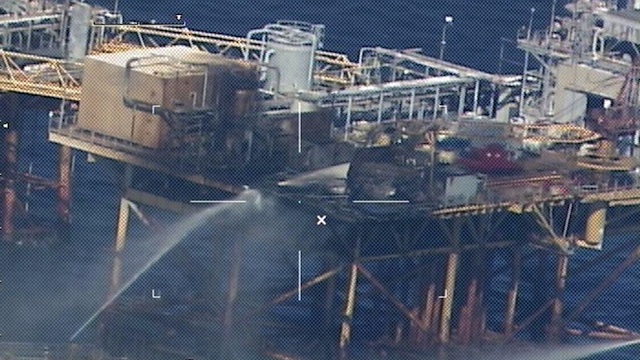SUMMARY
This is AI generated summarization, which may have errors. For context, always refer to the full article.

MANILA, Philippines – The Philippines requested the United States to investigate the death of a 38-year-old oil worker in the Gulf of Mexico, at least the fourth Filipino killed in the second deadliest US industry.
In a tweet on Thursday evening, October 31, the Philippine Embassy in the United States said Ambassador Jose Cuisia Jr made this appeal to the US Interior Department’s Bureau of Safety and Environmental Enforcement (BSEE).
“The Philippines expresses its deep concern over the safety of Filipinos working in offshore oil facilities in the US,” Cuisia said.
Peter Jorge Voces, 38, died on Sunday, October 27, while working on an oil platform. (READ: 2nd deadliest US industry kills another Filipino.)
He fell to his death after an empty storage tank knocked him off.
US authorities looked for him for almost two days, and found Voces’ body “pinned in the wreckage” 100 feet underwater.
His death came less than a year after 3 Filipinos, who also worked in the Gulf of Mexico, died afer an explosion on an oil platform. (READ: 3rd Filipino fatality in oil rig accident identified.)
2nd deadliest industry
Voces worked in the second deadliest industry in the US.
Statistics show that workers like him – who belong to the mining, quarrying, and oil and gas extraction industry – face a 15.6% risk of dying on the job.
This fatal work injury rate was the second highest in 2012, according to preliminary data from the US Bureau of Labor Statistics.
It was almost 5 times higher than the average. The industry, in fact, killed 177 people in 2012 alone.
The Philippine embassy said, “Although we hope Mr Voces’ death was not the result of platform safety issues, we expect the BSEE to thoroughly investigate the incident.”
“We urge US authorities, employers, and contractors to take concrete measures to protect our workers and prevent future incidents,” it added.
Physically taxing job
The job of Voces, who belonged to a derrick barge crew, was one of the most physically taxing.
His last assignment was to dismantle a platform of the Houston-based Talos Energy, an oil exploration company, according to a Talos official quoted by the Philippine embassy.
Transocean, a drilling services provider, says derrick barge welders “carry out welding, cutting, burning, and associated activities as directed on board the vessel.”
A similar company, Tetra Offshore Services, includes the following requirements for welders:
-
“Must be able to work 24-hour callout schedule and reliably report to work on time;
-
“Work long, strenuous hours, live and work offshore with limited medical care access, exposure to wet and/or humid conditions and temperature extremes, moving or mechanical parts, and loud noise;
-
“Wear required safety equipment, ride in a helicopter, crew boat, sling or basket, and swing on a rope to board offshore vessels or structures; and
-
“Be able to lift, move, or carry up to 25 to 50 lbs and meet other physical job requirements.”
For this, welders get around US$38,100 (P1.64 million) a year, according to US labor data as of May 2012.
This, compared to the highest paid US employees who get around $232,000 (P9.98 million) a year and the lowest paid ones who get around $18,600 (P799,800). – Rappler.com
Add a comment
How does this make you feel?
There are no comments yet. Add your comment to start the conversation.